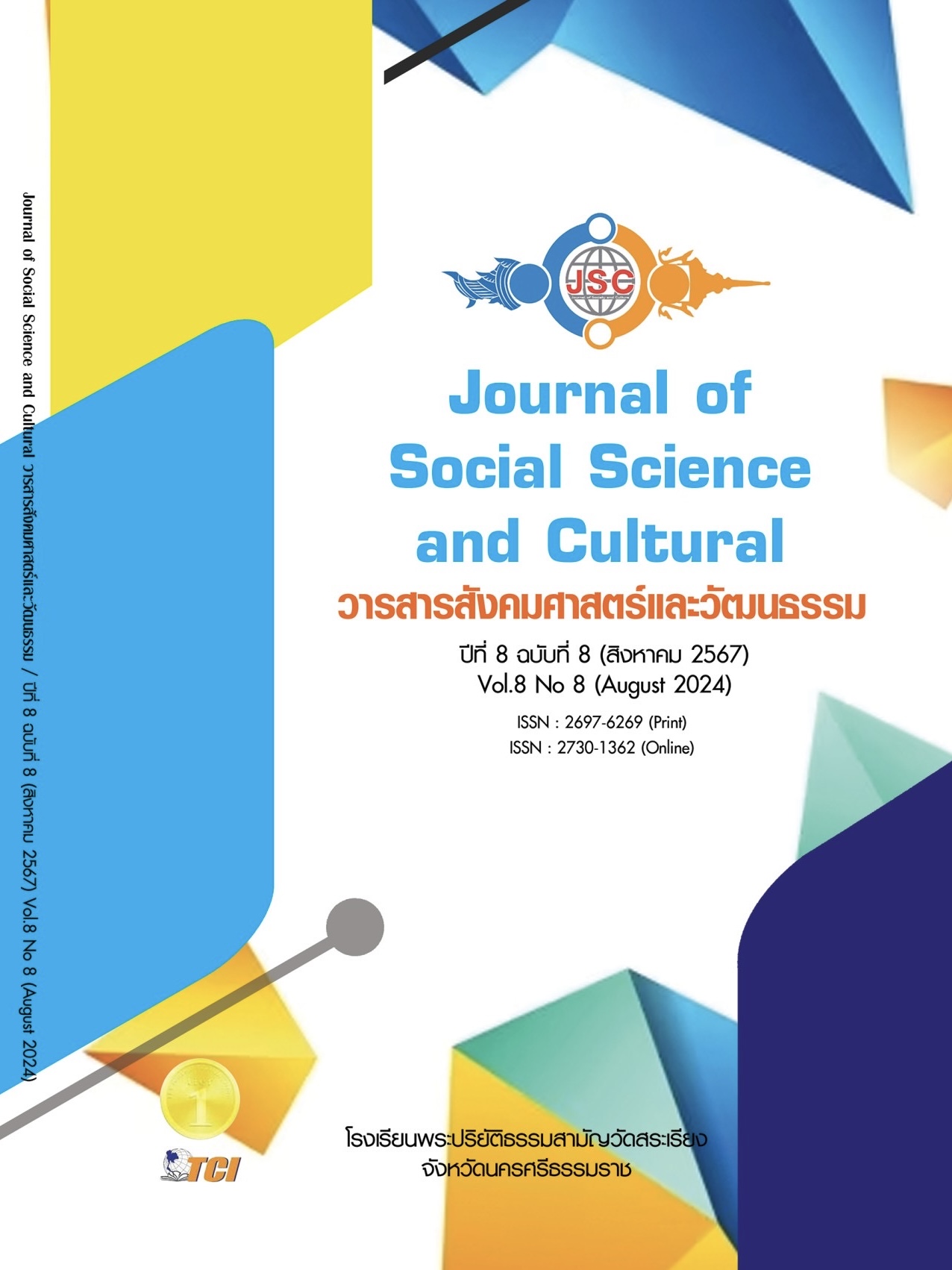MOTIVATING FACTORS AND GUIDELINES FOR DEVELOPING INDIVIDUALS TO LEAVE COMFORT ZONE: A CASE STUDY OF UNIVERSITY SUPPORT STAFF
Main Article Content
Abstract
The objectives of this research were to 1) Study the motivating factors for leaving the comfort zone of the support staff of a university and 2) Study the development approach of the support staff of a university to leave the comfort zone. This research used the quantitative research methodology, using a multi-stage random sampling method by stratified random sampling, and convenient data collection from 297 samples from a population of 1,150 people using a questionnaire that passed the content validity test with a value of 1 for all items and the reliability of the questionnaire was 0.894. The data were analyzed using descriptive statistics, including frequency, percentage, mean, standard deviation, and multiple regression analysis. The results of the research found that 1) The motivating factors classified by aspect that had the highest statistical significance on leaving the comfort zone of the support staff of a university were the motivating factor for leaving the comfort zone of being respected and the motivating factor for leaving the comfort zone of being responsible for working, with all aspects having high scores. 2) The development approach of the support staff of a university to leave the comfort zone found that the item with the highest mean value was the aspect of training for the development of the personnel. The item with the lowest mean value was personal development in terms of development, with all aspects having scores at a high level. The motivating factors classified by aspect that affect personal development to leave the comfort zone: A case study of support staff at a university with statistical significance were the variables in terms of being respected and in terms of responsibility for work.
Article Details
References
กฤษดา เชียรวัฒนสุข. (2560). แรงจูงใจที่มีอิทธิพลต่อผลการปฏิบัติงานของพนักงานกรณีศึกษา บริษัท ทีโอทีจำกัด (มหาชน) สำนักงานใหญ่แจ้งวัฒนะ. วารสารวิจัยมนุษยศาสตร์และสังคมศาสตร์, 3(2), 29-43.
จตุรงค์ นภาธร. (2565). ความสัมพันธ์ระหว่างความเครียดการสนับสนุนทางสังคมความรู้สึกมีคุณค่าในตนเอง. วารสารพยาบาล, 11(1), 17-29.
จิราพร ชุมบางหมัง. (2566). ปัจจัยที่ส่งผลต่อประสิทธิภาพการทำงานของบุคลากรบริษัท สีมาธุรกิจ จำกัด. ใน วิทยานิพนธ์บริหารธุรกิจมหาบัณฑิต สาขาวิชาวิทยาการจัดการ. มหาวิทยาลัยสุโขทัยธรรมาธิราช.
รัตนา บวรกิจ. (2565). ปัจจัยที่มีผลต่อพฤติกรรมการทำงานในยุคโควดิ-19 ของกลุ่มคนวัยทำงานในเขตกรุงเทพมหานคร. ใน วิทยานิพนธ์บริหารธุรกิจมหาบัณฑิต สาขาการเงินและธนาคารคณะบริหารธุรกิจ. มหาวิทยาลัยรามคำแหง.
ราตรี สุภาพันธ์. (2565). แรงจูงใจกับประสิทธิผลในการปฏิบัติงานของข้าราชการตำรวจกองอัตรากำลังสำนักงานกำลังพล. ใน สารนิพนธ์หลักสูตรรัฐประศาสนศาสตรมหาบัณฑิต สาขาวิชารัฐประศาสนศาสตร์. มหาวิทยาลัยเกริก.
ศาสตร์ศิลป์ ทองแรง. (2557). ปัจจัยที่มีผลต่อประสิทธิภาพในการปฏิบัติงานของบุคลากรสายสนับสนุน มหาวิทยาลัยราชภัฏอุบลราชธานี. ใน วิทยานิพนธ์บริหารธุรกิจมหาบัณฑิต สาขาวิชาการจัดการ. มหาวิทยาลัยราชภัฏอุบลราชธานี.
สถาบันเทคโนโลยีราชมงคล. (2567). ฝ่ายบุคคล. ปทุมธานี: สำนักบริหารกลาง.
สถาบันเพิ่มผลผลิตแห่งชาติ. (2566). เอกสารประกอบการอบรม How to Manage Hybrid/ Remote Working that “Work” (บริหารการทำงานรูปแบบ Hybrid/ Remote Work). กรุงเทพมหานคร: สำนักพิมพ์วิทยพัฒน์ จำกัด.
สำนักงานคณะกรรมการอุดมศึกษา. (2561). ราชกิจจานุเบกษา เล่มที่ 135 ตอนที่ 11 ก หน้า 3 - 5. (23 กุมภาพันธ์ 2561).
อรรถสิทธิ์ ตันติยุทธ์. (2564). ปัจจัยที่มีผลต่อแรงจูงใจในการปฏิบัติงานของพนักงานกองบำรุงรักษาการประปานครหลวง. ใน สารนิพนธ์วิศวกรรมศาสตรมหาบัณฑิต สาขาวิชาการจัดการวิศวกรรม. มหาวิทยาลัยสยาม.
Rensis, L. (1961). New Pattern of Management. New York: McGraw-Hill.


